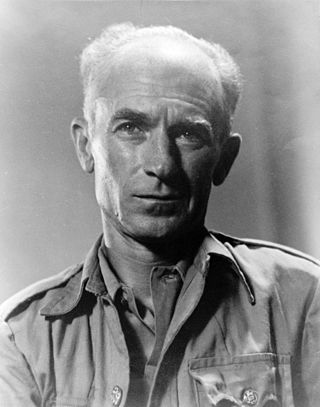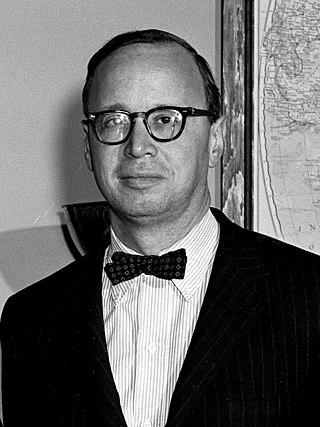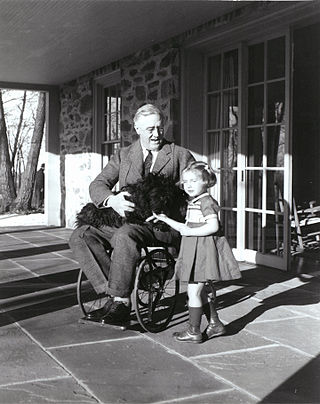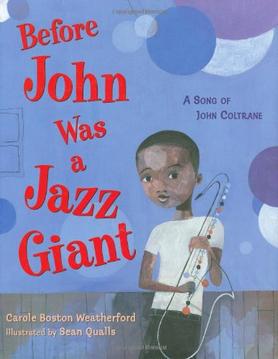
Theodore Roosevelt Jr., also known as Teddy or T. R., was the 26th president of the United States, serving from 1901 to 1909. Roosevelt previously was involved in New York politics, including serving as the state's 33rd governor for two years. He served as the vice president under President William McKinley for six months in 1901, assuming the presidency after McKinley's assassination. As president, Roosevelt emerged as a leader of the Republican Party and became a driving force for anti-trust and Progressive policies.

Anne Patricia Carson is a Canadian poet, essayist, translator, classicist, and professor.

Ernest Taylor Pyle was an American journalist and war correspondent who is best known for his stories about ordinary American soldiers during World War II. Pyle is also notable for the columns he wrote as a roving human-interest reporter from 1935 through 1941 for the Scripps-Howard newspaper syndicate that earned him wide acclaim for his simple accounts of ordinary people across North America. When the United States entered World War II, he lent the same distinctive, folksy style of his human-interest stories to his wartime reports from the European theater (1942–44) and Pacific theater (1945). Pyle won the Pulitzer Prize in 1944 for his newspaper accounts of "dogface" infantry soldiers from a first-person perspective. He was killed by enemy fire on Iejima during the Battle of Okinawa.

Arthur Meier Schlesinger Jr. was an American historian, social critic, and public intellectual. The son of the influential historian Arthur M. Schlesinger Sr. and a specialist in American history, much of Schlesinger's work explored the history of 20th-century American liberalism. In particular, his work focused on leaders such as Harry S. Truman, Franklin D. Roosevelt, John F. Kennedy, and Robert F. Kennedy. In the 1952 and 1956 presidential campaigns, he was a primary speechwriter and adviser to the Democratic presidential nominee, Adlai Stevenson II. Schlesinger served as special assistant and "court historian" to President Kennedy from 1961 to 1963. He wrote a detailed account of the Kennedy administration, from the 1960 presidential campaign to the president's state funeral, titled A Thousand Days: John F. Kennedy in the White House, which won the 1966 Pulitzer Prize for Biography or Autobiography.

The Story of G.I. Joe, also credited in prints as Ernie Pyle's Story of G.I. Joe, is a 1945 American war film directed by William A. Wellman and starring Burgess Meredith and Robert Mitchum. The film was nominated for four Academy Awards, including Mitchum's only career Oscar nomination.
Joseph Leon Edel was an American/Canadian literary critic and biographer. He was the elder brother of North American philosopher Abraham Edel.

Geoffrey Champion Ward is an American editor, author, historian and writer of scripts for American history documentaries for public television. He is the author or co-author of 19 books, including 10 companion books to the documentaries he has written. He is the winner of seven Emmy Awards.
Arthur Edmund Morris was an American-South African writer, known for his biographies of U.S. Presidents. His 1979 book The Rise of Theodore Roosevelt won the Pulitzer Prize for Biography or Autobiography and was the first of a trilogy of books on Roosevelt. However, Morris sparked controversy with his 1999 book, Dutch: A Memoir of Ronald Reagan, due to its extensive use of fictional elements.

Rexford Guy Tugwell was an American economist who became part of Franklin D. Roosevelt's first "Brain Trust", a group of Columbia University academics who helped develop policy recommendations leading up to Roosevelt's New Deal. Tugwell served in FDR's administration until he was forced out in 1936. He was a specialist on planning and believed the government should have large-scale plans to move the economy out of the Great Depression because private businesses were too frozen in place to do the job. He helped design the New Deal farm program and the Resettlement Administration that moved subsistence farmers into small rented farms under close supervision. His ideas on suburban planning resulted in the construction of Greenbelt, Maryland, with low-cost rents for relief families. He was denounced by conservatives for advocating state-directed economic planning to overcome the Great Depression.
The Years of Lyndon Johnson is a biography of Lyndon B. Johnson by the American writer Robert Caro. Four volumes have been published, running to more than 3,000 pages in total, detailing Johnson's early life, education, and political career. A fifth volume is expected to deal with the bulk of Johnson's presidency and post-presidential years. The series is published by Alfred A. Knopf.

Neal Gabler is an American journalist, writer and film critic.

Franklin D. Roosevelt, later the 32nd president of the United States from 1933 to 1945, began experiencing symptoms of a paralytic illness in 1921 when he was 39 years old. His main symptoms were fevers; symmetric, ascending paralysis; facial paralysis; bowel and bladder dysfunction; numbness and hyperesthesia; and a descending pattern of recovery. He was diagnosed with poliomyelitis and underwent years of therapy, including hydrotherapy at Warm Springs, Georgia. Roosevelt remained paralyzed from the waist down and relied on a wheelchair and leg braces for mobility, which he took efforts to conceal in public. In 1938, he founded the National Foundation for Infantile Paralysis, leading to the development of polio vaccines. Although historical accounts continue to refer to Roosevelt's case as polio, the diagnosis has been questioned in the context of modern medical science, with a competing diagnosis of Guillain–Barré syndrome proposed by some authors.
Robert Hugh Ferrell was an American historian. He authored more than 60 books on topics including the U.S. presidency, World War I, and U.S. foreign policy and diplomacy. One of the country's leading historians, Ferrell was widely considered the preeminent authority on the administration of Harry S. Truman, and also wrote books about half a dozen other 20th-century presidents. He was thought by many in the field to be the "dean of American diplomatic historians", a title he disavowed.
Geoffrey O'Brien is an American poet, editor, book and film critic, translator, and cultural historian. In 1992, he joined the staff of the Library of America as executive editor, becoming editor-in-chief in 1998.

Margarita Engle is a Cuban American poet and author of many award-winning books for children, young adults and adults. Most of Engle's stories are written in verse and are a reflection of her Cuban heritage and her deep appreciation and knowledge of nature. She became the first Latino awarded a Newbery Honor in 2009 for The Surrender Tree: Poems of Cuba's Struggle for Freedom. She was selected by the Poetry Foundation to serve from 2017 to 2019 as the sixth Young People's Poet Laureate. On October 9, 2018, Margarita Engle was announced the winner of the 2019 NSK Neustadt Prize for Children's Literature. She was nominated by 2019 NSK Prize jury member Lilliam Rivera. Her 2024 book, Wild Dreamers, was longlisted for the National Book Award for Young People's Literature.
Philip Hope Percival (1886–1966) was an English-born renowned white hunter and early safari guide in colonial Kenya. During his career, he guided Theodore Roosevelt, Baron Rothschild, and Ernest Hemingway on African hunts. Hemingway modelled the fictional hunter Robert Wilson in his story "The Short Happy Life of Francis Macomber" after Percival. Percival also worked with well-known white hunters like Bror von Blixen-Finecke and mentored Sydney Downey and Harry Selby, and was known in African hunting circles as the "Dean of Hunters".

Before John Was a Jazz Giant: A Song of John Coltrane is a children’s picture book written by American author and critic Carole Boston Weatherford and illustrated by Sean Qualls. It tells the story of a young John Coltrane growing up in the South in the 1930s. It was published by Henry Holt in 2008.
The National Book Critics Circle Award for Poetry, established in 1975, is an annual American literary award presented by the National Book Critics Circle (NBCC) to promote "the finest books and reviews published in English". Awards are presented annually to books published in the U.S. during the preceding calendar year in six categories: Fiction, Nonfiction, Poetry, Memoir/Autobiography, Biography, and Criticism.
The National Book Critics Circle Award for Biography, established in 1983, is an annual American literary award presented by the National Book Critics Circle (NBCC) to promote "the finest books and reviews published in English." Awards are presented annually to books published in the U.S. during the preceding calendar year in six categories: Fiction, Nonfiction, Poetry, Memoir/Autobiography, Biography, and Criticism.
Rebecca Donner is a Canadian-born writer. She is the author of All the Frequent Troubles of Our Days, which won the 2022 National Book Critics Circle Award for Biography, the PEN/Jacqueline Bograd Weld Award, and The Chautauqua Prize She was a 2023 Visiting Scholar at Oxford, and was elected a Fellow of the Royal Historical Society in recognition of her contribution to historical scholarship. She is currently a 2023-2024 Fellow at Harvard.










